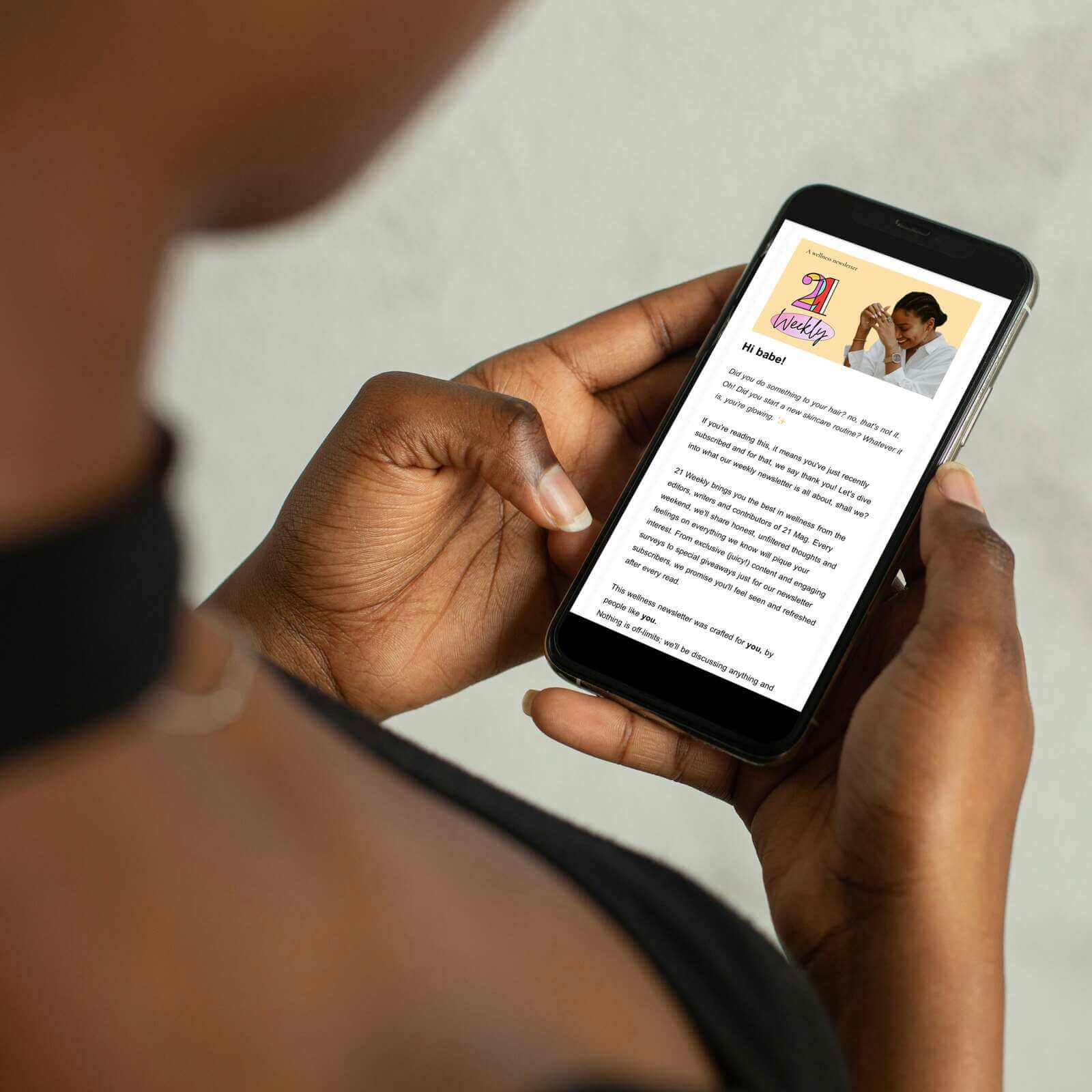No products in the cart.
Chioma Ikokwu on Her Stylish Success
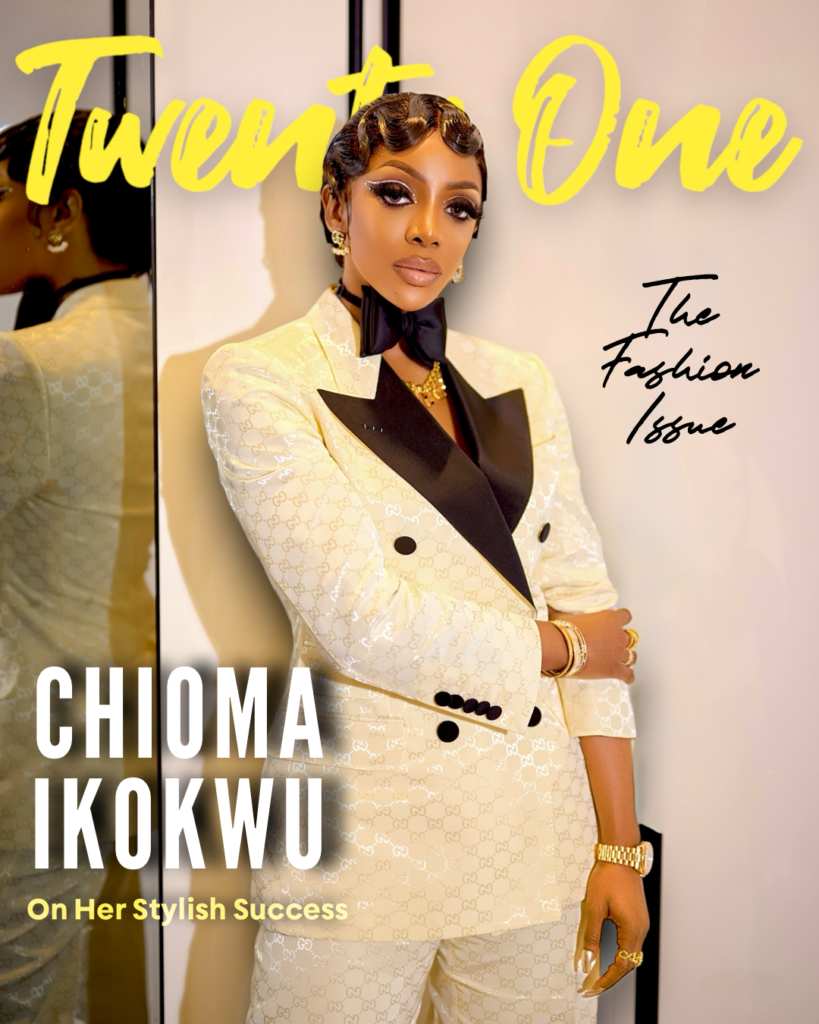
CREDITS
Editor-in-Chief: Fifunmi Osinubi
Words by: Princess Briggs
Pant-suit: Gucci
Jewellery: Gucci, Cartier, Rolex
Photography: Photo Freak
Makeup: Tolu Felix
Graphic Designer: Fifunmi Osinubi
Hairstylist: Good Hair
Videography: Reels by Treasure
When I ask Chioma how she would describe herself, she responds with something that sounds like a ‘tch’, “That is such a hard question.” I quietly grin to myself. It is an oddly tricky question. Chioma Ikokwu is a Nigerian entrepreneur and co-founder of Good Hair, a beauty and lifestyle brand, and Brass and Copper Lifestyle, a restaurant, bar and lounge all based in Lagos, Nigeria. Chioma Ikokwu gained popularity not only for her business ventures but also for her presence on social media platforms, where she shares her fashion and lifestyle experiences and, eventually, for being a part of the Real Housewives of Lagos cast. She considers herself “a very normal person who doesn’t appear very normal but is incredibly down to earth, fun, friendly and kind.”
Popularly known as ChiomaGoodHair, Chioma Ikokwu started her first business venture at the University of Birmingham’s campus while studying Law at 18. In an interview on Tea with Tay, Chioma shares how the hair franchise Good Hair was born. She expresses her love for high-quality hair that existed then and still does now. She affirms that only a few people were in the hair business then. So, when schoolmates accosted her, impressed by the full installation she had at school, “the sharp Igbo girl in her” immediately declared that she sold it. She had just found a cheaper supplier and was excited to stock up on the bundles she loved while making some extra money on the side. Quickly after, Kika Osunde, whom she had started talking to because she always had good hair lace on, joined her. Osunde came with the lace, and Ikokwu with the hair bundles.
Years after Good Hair became so successful, the bestfrienprenuers started another business venture called Brass and Copper. This restaurant is situated in the heart of Lagos at Lekki Phase 1 in the Good Hair space that comprises the Good Hair salon/store, a men’s salon called Next by GoodHair and eventually, Brass & Copper. Not long after, Ikokwu started a non-profit charity organisation called the GoodWay Foundation. Now, she has birthed Chioma’s Closet.
When asked how she navigates the intricacies of a diverse business landscape and how it contributed to her professional growth, Ikokwu starts by sharing one of her “personal mottos”.
“Whatever’s worth doing is worth doing well”
“If I’m going to embark on anything in life, be it business, friendships, or anything at all, I want to give it a hundred percent. I want to put my all in it. I don’t do things haphazardly. I do it to perfection.” Ikokwu expresses that as a perfectionist, there’s nothing worse than starting so many projects that differ from each other. “I think with Good Hair, Brass & Copper, Good Way, Chioma’s Closet and everything else I have going on; it can get challenging because what tends to happen is I have to spread myself across evenly, but that takes away from me as a person.” Ikokwu finds that sometimes, her social life suffers because she’s working so hard. “What tends to happen is, when I eventually take a break, it’s almost like I log out of my social life, and I’m like- ‘oh my God, I’m so tired, I’m so tired’. Then I check out of everything, which is not necessarily the best balance. You want to keep it kind of even across the board. So, even though I know this subconsciously, the perfectionist in me wants to do it to the best of my abilities.”
She reveals that her perfectionism often causes her to hyper-focus. “For instance, when it was just Good Hair, I gave my all; putting all my energy into it. It was very successful for as many years as we were doing that on its own, then Brass & Copper came. I was still putting my energy into Good Hair, but luckily, I have a business partner. So it didn’t necessarily dip, but it probably would have if I were doing it alone.”
Brass & Copper started doing well and making so much money, but Ikokwu realised she was neglecting her hair franchise, Good Hair. “My Good Hair staff began to notice a shift—they felt I wasn’t prioritising the brand or their well-being. It seemed like my focus was more on Brass and Copper.” She had to pull herself back in and learn to split her time more evenly.
Ikokwu concludes that juggling all she does has opened her mind to various fields and types of people. It’s allowing her to navigate the entrepreneurial space with experience. “Because I’ve had a lot of experience running Good Hair and Brass and Copper, I’m the best at handling staff. I’ve worked with so many different types of people, even more so than my business partner when it comes to training the staff, dealing with them, and even dealing with their emotional and psychological issues. They all come to me because of that experience.”
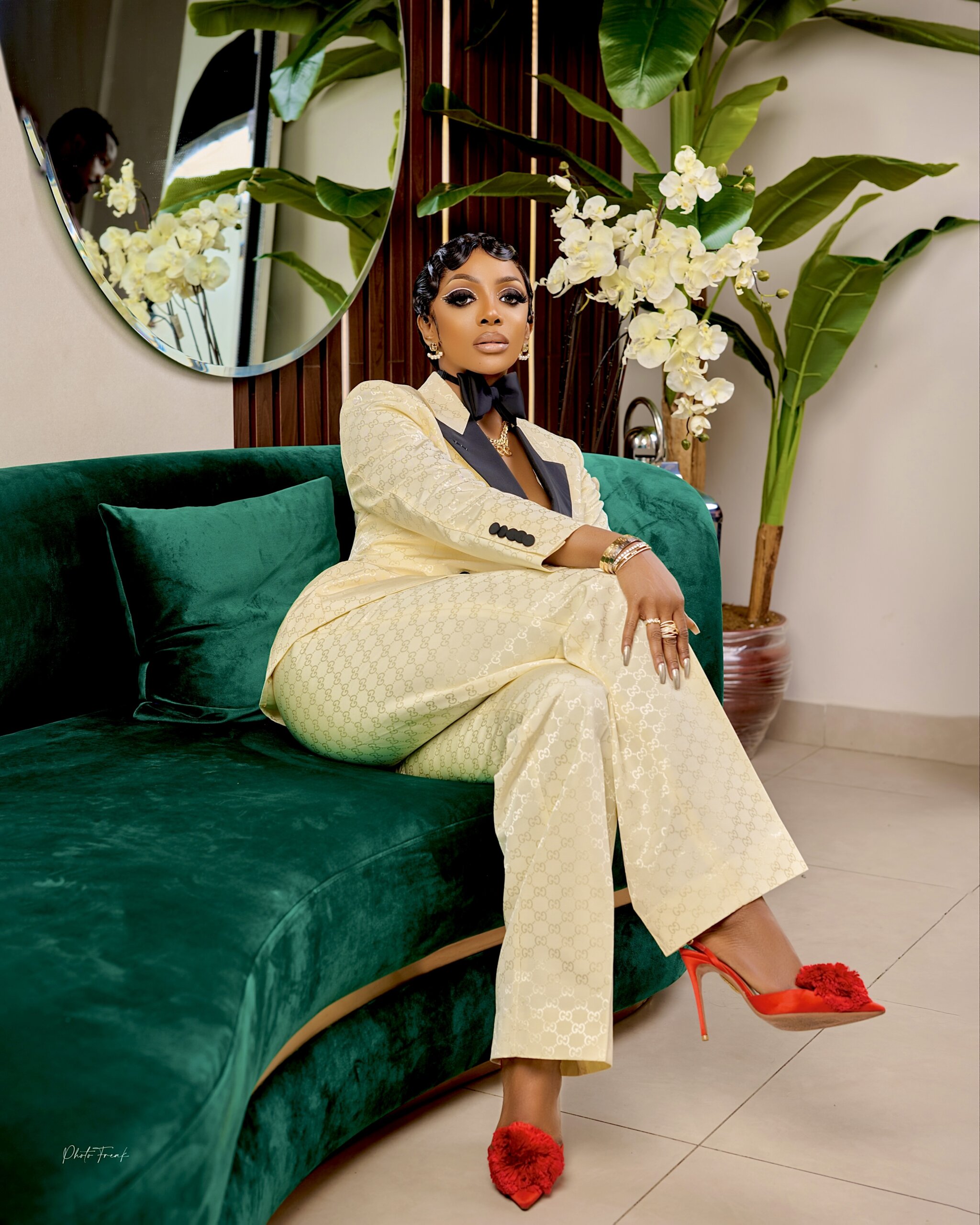
Ikokwu admits that despite her success, it can prove challenging to handle all these ventures. That’s where her law degree usually comes in. “Luckily for me, Law ties into everything, so I find that my legal skills come in handy with every business I venture into. Whether it’s with contracts, partnerships, employment and so on. I feel like, as a lawyer, you’re constantly thinking and working your brain over time. You also tend to see things from all different angles and perspectives because you’re literally trained to.”
Ikokwu believes her lawyer instincts have set her apart from other business owners. “I look at things from a critical standpoint, so before I even venture into a business, I would have considered it from all angles and all elements surrounding it. This means I go in fully informed, leading to a higher chance of success due to the thorough due diligence I’ve conducted.”
Though having a legal background had many pros, the cons had their moments of creeping up on her. “It’s not easy to do these many things”, she states. At times, she had legal cases while simultaneously running her businesses. During her Executive Coaching Program, there were instances where clients would schedule time slots that coincided with emergency meetings for one of her businesses, or clients on the legal side would come calling. It can quickly become overwhelming, but Ikokwu imparts that “balance and scheduling is key”. As such, she started actively trying to hire right, learning to delegate and fully settling into the CEO role. At the same time, she would usually do every single thing herself. It’s easy to see how that can quickly fall apart in the long term. Passionately, Ikokwu commends her team. She’s hired people like her EA, PA, and others in different roles that help her schedule, so she has no clashes. “They have a solid reminder system that ensures I show up to everything and on form.”
Ikokwu stresses that her health is everything in managing and balancing all her different roles.
“There was a time when I wasn’t even aware that a condition called burnout existed”
She recalls a period just after she and Osunde had opened the Good Hair space and were running Good Hair, Brass and Copper, her private practice, and executive coaching simultaneously. She burnt out. She was so on top of everything career-wise that all else suffered. She had next to zero social life, wasn’t in great shape because of a lack of exercise, wasn’t eating right and would only eat whenever she got the chance.
She had to take time off and wholly re-strategise and restructure how she ran her life and her businesses. She needed to create that balance. So, she did. She first started by ensuring that her health was optimum because “health is wealth”. She focused on regular exercise and proper dieting. They were crucial to her recovery.
Naturally, her mental and spiritual health had to be addressed as well. Ikokwu explains that though she is religious, she is primarily spiritual. “I have an excellent relationship with God. I pray about everything. I commit everything to God’s hands before I start my day, a meeting or anything whatsoever. I pray about it, ensuring that my spiritual mind is right.”
Being the last of five, it’s not difficult to understand why family is so important to the business mogul. She has a great support system in her family. “I think that’s another thing that’s really shaped me and has set me apart from somebody just doing it alone.” That incredible support from her family and her best friend/business partner has been a great help to this business sensation.
When Ikokwu was asked to star in The Real Housewives of Lagos, she was taken aback. One, she’s a lawyer and Businesswoman who just so happens to adore fashion. She’s not an actress. Two, she’s not a housewife and has never been married. And lastly, was this something she wanted? To have the world peer into her life and make their judgements and whatnots about her, her family and lifestyle? Could this potentially inflict more harm than offer beneficial visibility to her and her business? In the end, Ikokwu decided to give it a go. It couldn’t hurt anyone.
Luckily, she’s always been in the spotlight. As a fashion girl and a renowned business entrepreneur, she’s always had people who supported her, so after Real Housewives took off, the notoriety and fame that came with it weren’t far-fetched from her reality. However, it has brought more exposure to her, and she believes it’s been an excellent experience. She has more visibility, fans, and naturally more haters, “It’s definitely put me out there a lot more than I was”.
She acknowledges that there are both advantages and disadvantages to it. It’s gratifying when people publicly express their admiration, sharing how much you’ve inspired them. “It’s a good feeling. We’re human. It’s nice to know somebody likes you,” Ikokwu explains. In terms of visibility for her businesses and the projects she’s involved in or planning, it’s excellent as it provides her with a diverse, worldwide audience. In that sense, being part of RHOL is fantastic.
On the downside, she lost her privacy. “I cannot make the decision that I want a quiet day out. That’s not up to me. That’s up to God. If he decides that I’m not going to have anyone who knows me or recognises me in the streets or in the restaurant, or the country that I’m travelling to, and no one will know who I am, then that will happen. But there’s almost always a 95% chance that somebody will recognise and approach me”.
Whilst it’s great for the most part, as a human being, there are times when you want to be alone, or you want to have a private relationship, or a bad day without having to deal with other people’s feelings or opinions about it. Ikokwu loves her life, but there are days when fame gets in the way of her being human. She adds that sometimes she’s not in the mood to interact with people in public, or it’s just not the right time. Still, even when approached by people, she consistently wears a smile, regardless of her personal or emotional state. She strives to appear in good spirits because not doing so might lead others to perceive her as mean, proud, or other things. Ikokwu emphasises her desire to avoid being perceived in such a manner.
Being part of the RHOL cast and the ensuing fame made her life accessible to everyone, fostering a sense that people could form opinions about her and dictate how she should live. “When people see you on TV, there’s this direct bond or entitlement to your being, where they feel like they know you and can tell you what to do and how to live. People become a lot more critical about the things you do. So, maybe certain things I would have worn and got away with before, now people will tell me, ‘How can you wear this? Why are you wearing this?'” This created a sense of entitlement in her private life. Despite Ikokwu laughing a bit, it’s evident she’s not amused. She doesn’t appreciate people judging her character as if they truly know her. She also disliked being portrayed as disloyal in the show’s first season. Even in instances where she displayed loyalty, criticism came her way, with people claiming she was too loyal. She honestly never cared for the fact that, no matter what she did, she could never seem to win.
Despite her deep displeasure, Ikokwu found a way to deal with it. She doesn’t engage when people talk negatively to her, not on social media or IRL. “I don’t even acknowledge it. I don’t allow it to register in my brain. I see it, and I keep it moving.”
She’s actively working her way around all the negative aspects of this level of fame and is starting to understand how to navigate showbiz. In general, she acquises that it definitely has more benefits than disadvantages.
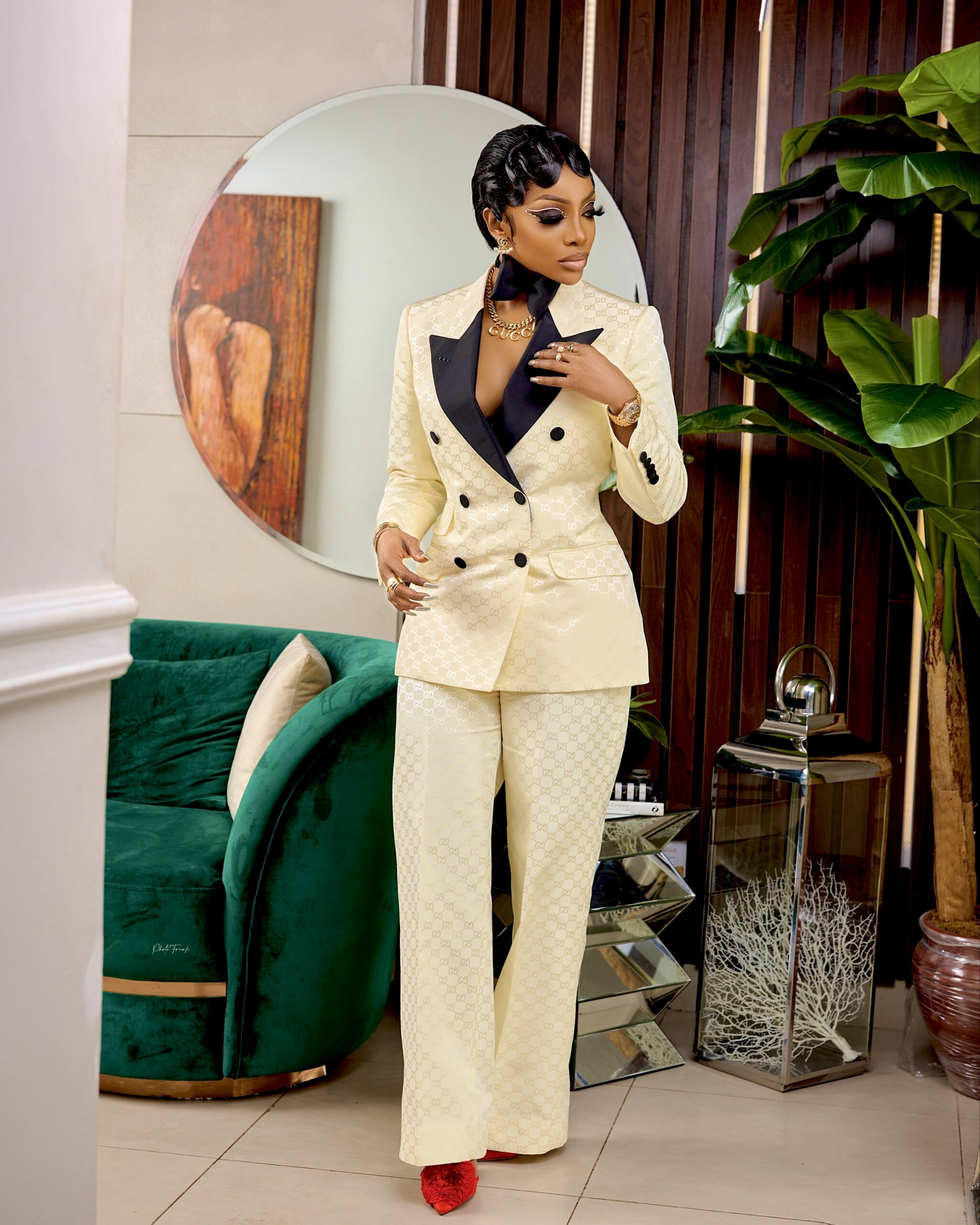
With the addition of a new business portfolio, Ikokwu has fully stepped into the fashion business with her recently launched venture, Chioma’s Closet. Her journey in the fashion world, from Good Hair to Chioma’s Closet, represents a significant evolution. Ikokwu asserts that there isn’t one defining moment that inspired adding fashion to her business portfolio.
“I cannot say that there was one moment because fashion is something that I live, breathe, eat. It’s just a part of me. So, that’s something that people would describe me as; a fashion girl”
Venturing into the fashion business had been something she had contemplated for a considerable amount of time. In 2020, she began seriously considering it, prompted by the consistent advice that she should have her own fashion line. Moreover, while her mother is a practising medical doctor, she also maintained a tailoring business, crafting dresses for friends and colleagues. The fact is that Ikokwu has always had a connection to the world of fashion, and having her own fashion line has been a long-standing aspiration. “It’s something that I liked and admired”. As ironic as it is, her success was the only thing stopping her. “You know, when you’re successful in a particular field, there’s not much need or desire to delve into another if that makes sense. If you have a job and are making a lot of money, you won’t consider applying elsewhere. So, even though fashion is her heart and soul, she was already so comfortable in her existing businesses and didn’t want to spread herself too thin that she put it aside for the time being.
However, with 2020 came covid. A lot of terrible things happened that year, but a lot of magnificent things also happened. Ideas and new inventions took the world by storm. The lockdown pushed people to think about their lives and what they could be. That’s when Ikokwu started to consider fashion seriously and decided to do a bit of research. At the time, she wanted to jump into fast fashion, but when she began her research, she realised it was more complex. “As I said, whatever’s doing is worth doing well”, and because of how renowned she is in the fashion scene, Ikokwu decided that if she was not going to do it properly, she didn’t want to do it at all. “I also didn’t want to come and just be like a little droplet of water in this mighty ocean where I don’t make an impact”.
“I didn’t want to do fashion just casually. I was like, if I’m going to come into this space, let me come well. Let me come different and prepared, and I think that’s what happened with Chioma’s Closet.” She’s always known she could sell her clothes. People have asked for her clothes daily, so she was confident in finding buyers. However, she wanted this to be impactful. She wanted it to be purposeful. She wanted to actually have a mission. Though she can’t recall the exact day, the idea for Chioma’s Closet was born soon after. Almost immediately, Ikokwu realised she could marry her foundation- the Goodway Foundation and Chioma’s Closet.
The Goodway Foundation is a self-funded non-profit organisation. They deal with poverty alleviation, education, women empowerment and more. Before Chioma’s Closet, the foundation was self-funded the entire time. “It can be very punitive because when you make all these promises to people, you have to fulfil them because they will ask.” The problem is that the foundation only ran for as long as Ikokwu had the money to spare. So, when she did, she threw some money into the foundation, and when she didn’t, the foundation had to wait, which isn’t the best way to go.
“With Chioma’s closet, I thought, if I could sell the old clothes I’ve worn and allocate 50 per cent of the profit to the foundation, it would enable the foundation to operate actively year-round. This way, we wouldn’t face downtimes or periods of inactivity. It would consistently run because it would have funds.”
“I always say this to my mentees: the best way to do business is to be organic. Allow it to grow organically. I have all these plans and all these ideas for Chioma’s closet, but I’m gonna let it grow organically. I’ll do things at my own pace. I’ll see what works and what doesn’t and run with it. We started with just selling my old clothes. We now proceeded to work with designers by collecting stock from them so we have inventory, then we sell, and we get a commission, and eventually, we’re gonna start producing our own items to sell”
After Chioma’s Closet took off, she realised that a diverse range of women in various sizes could love her clothes. She then had the brilliant idea to have the designers she partnered with start making the same outfits in different sizes, up to size 18. When asked why she made that decision, she said, “I think inclusivity is necessary. Social media has broadened our horizons, perspectives, and knowledge base. You now realise that there’s not that much inclusivity when it comes to fashion and beauty. As black people, I’m sure we can all relate. It was only- what? Three years ago, Rihanna came up with the bright idea of having a collection of foundations in all shades. Before that, everybody was using MAC NW47 or NC50. We all squeezed between those two shades, which made no sense. It made makeup so much more difficult for black women, and that’s kind of how it is with fashion. You find that many style designs only go up to a certain size and, therefore, are not inclusive of plus-size people. Also, the styles are just not feasible. You’d have people with collections of outfits that only look great on people who are UK size 12 and below. I didn’t want to do that. I wanted to ensure that my brand could appeal to every single person. I make sure that I work with designers from different ranges because even though ideally, it’ll be nice to work with what I know, what I understand, what I love, what I can wear and what I can advertise, for the sake of inclusivity, I’m collaborating with designers catering to all sizes—those creating clothes with plus-size individuals in mind, others designing for someone with a UK size 4, and everything in between. So, when you visit our website, you’ll discover something that appeals to everyone, regardless of their size.”
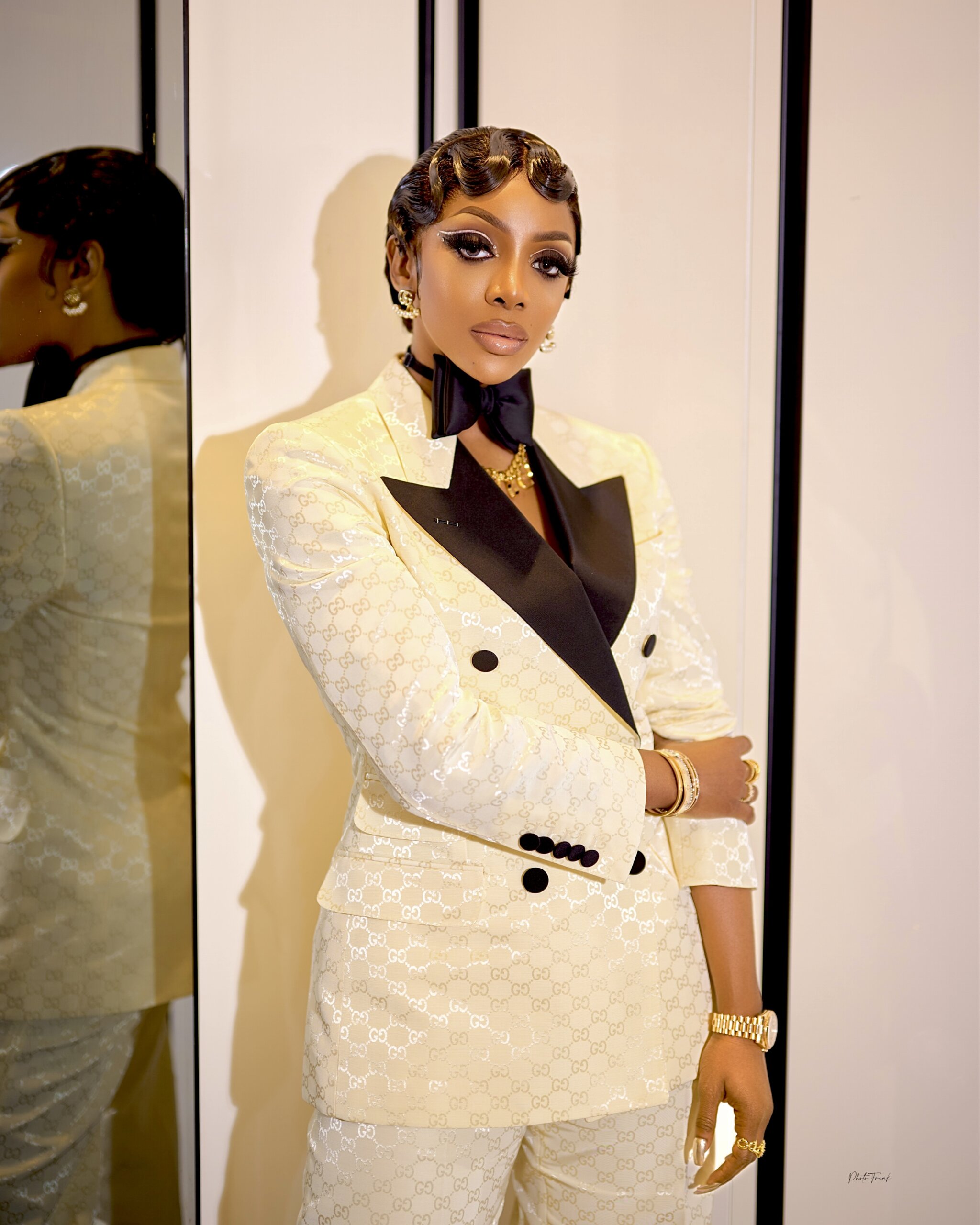
This new beginning in style signifies a fresh start in Ikokwu’s fashion journey. She hopes to use her influence to redefine standards of beauty and style, fostering a more inclusive representation in the fashion industry. Inclusivity is her watchword, so she ensures they always have pieces that suit everyone’s aesthetic. Whether it be men dressing as women, women dressing as men or plus-sized women wearing what people would consider ‘skimpy’ or a skinny girl wearing baggy clothes. “For us, it’s very diverse. It’s very, very acceptable, you know? There’s no discrimination where Chioma’s Closet is concerned, and as an influencer, I want to represent this more by being more versatile in my dressing and style. I want to pick a range of pieces that I know appeal to different aesthetics and advertise them as if they were my aesthetic just for people to understand.
“Anybody can wear anything and look good in any piece they want, as long as they feel confident. It doesn’t matter what you’re wearing, how others interpret it, or what societal standards say”
Ikokwu hopes that with her page and her social media following, people can see that there are no boundaries when it comes to fashion. There are no rules in the game. Whatever makes you happy, whatever you feel comfortable in, is what you’re allowed to wear and what you’re allowed to work with. “Do you! The world will adjust. That’s literally what I go by. It’s always worked. Be yourself, and people will eventually appreciate you for owning your truth.”
Whether Ikokwu intended to or not, her achievements have empowered numerous women. She not only has the ability to influence women, but she also recognises the extent of her impact on people of all ages, whether young, old or her contemporaries. Ikokwu acknowledges that she resonates with individuals she’s never met, living in countries she’s never visited. She believes this connection exists because, historically, women have been stifled, told they can’t pursue certain paths, confined to traditional roles like being in the kitchen or at home, raising children, while men are expected to earn money. This dynamic, in turn, leads to significant disrespect within households.
At the end of the day, when someone is financially providing for you, and you have no means of your own, you tend to acquiesce to whatever that provider wants, but Ikokwu knows that young girls watch her and have seen that you can be anything you want to be. “As I mentioned, I’m a lawyer. So, when it comes to education, I’ve got that covered—I hold a master’s degree, attended law school, and consistently earned top distinctions, graduating with straight A’s. I’m also an entrepreneur. There’s no reason you can’t pursue your actual profession, whether it’s law, medicine, or any other field, while also being an entrepreneur. You can follow your passion, run your business, and generate extra income on the side.”
Ikokwu asserts that Good Hair blew up the way it did because when she came to Nigeria, went to law school, and started working at a law firm, the pay didn’t make any sense. Lawyers in Nigeria do not get paid well, and based on the life she had already started living in England, there was no way she could maintain that lifestyle on a lawyer’s salary in Nigeria. “I was like, you know what, I’m going to run my business simultaneously because I need something that will bring me proper income whilst practising this profession that I’ve studied so hard for. I did it, and I was successful at it. I was still working as a lawyer even though when I left the law firm, I started my private practice. I worked as a private lawyer while simultaneously running my business.” Ikokwu believes that because she generates substantial income from her businesses, young girls studying to become lawyers, perhaps due to parental expectations, but seeking guidance on balancing law and entrepreneurship, reach out to her. “They’ve seen me do it, so they know it’s possible. They contact me for additional tips on achieving it, but the key is that people now recognise it’s feasible to do both. I’ve not only demonstrated that you can maintain your profession and be a successful entrepreneur, but I’ve also illustrated that you can diversify your entrepreneurship portfolio as well.”
She shares that even while doing all of this, she still had successful relationships, disproving the belief that if you’re successful, you won’t have a man or that men run away. “I have shown that it’s not true. I’ve defied all the odds. I’ve had very successful relationships, some public, some not. I still worked hard. I was still thriving and respected.” Ikokwu strongly believes that we can have it all as women. “We can. We can do it all. We can be it all, and I’ve shown that success successfully.”
Through the Good Way Foundation, the Fund My Startup Initiative aims to support and empower women in entrepreneurship. “Coming out of the pandemic, with so much uncertainty, we decided to assist by providing seed capital for these businesses. Here’s how it works: we announce the initiative, receive numerous applications with business plans and proposals, shortlist a select few, conduct interviews, and identify the most promising business plans or ideas. I then secure sponsors for these businesses. We provide them with some or all of their seed capital, and they launch their businesses. We’ve seen several success stories, including a woman in Delta State excelling in a plastic recycling business, another finding success in the food industry, and assisting a woman in Kenya in establishing a thriving business. Our initiative has contributed to several women emerging stronger on the other side.”
Another project is the Blessed to Be a Blessing initiative. That’s when the foundation works with certain people to help empower everyone in a particular community. “We pick a few women, support their businesses, and give them seed capital. They start said businesses on the premise that they employ people from within their community.” That way, whatever benefits they have from their businesses trickle down to the community, utilising employment and apprenticeships. “You have people within your community learning the same trade and earning a salary; that way, more and more people are blessed in that community from that one person’s business. I hope that in the near future, we can expand because those are great models to empower women, especially when it comes to women in business. We plan to grow, make it bigger, have bigger events, and reach out to more people”
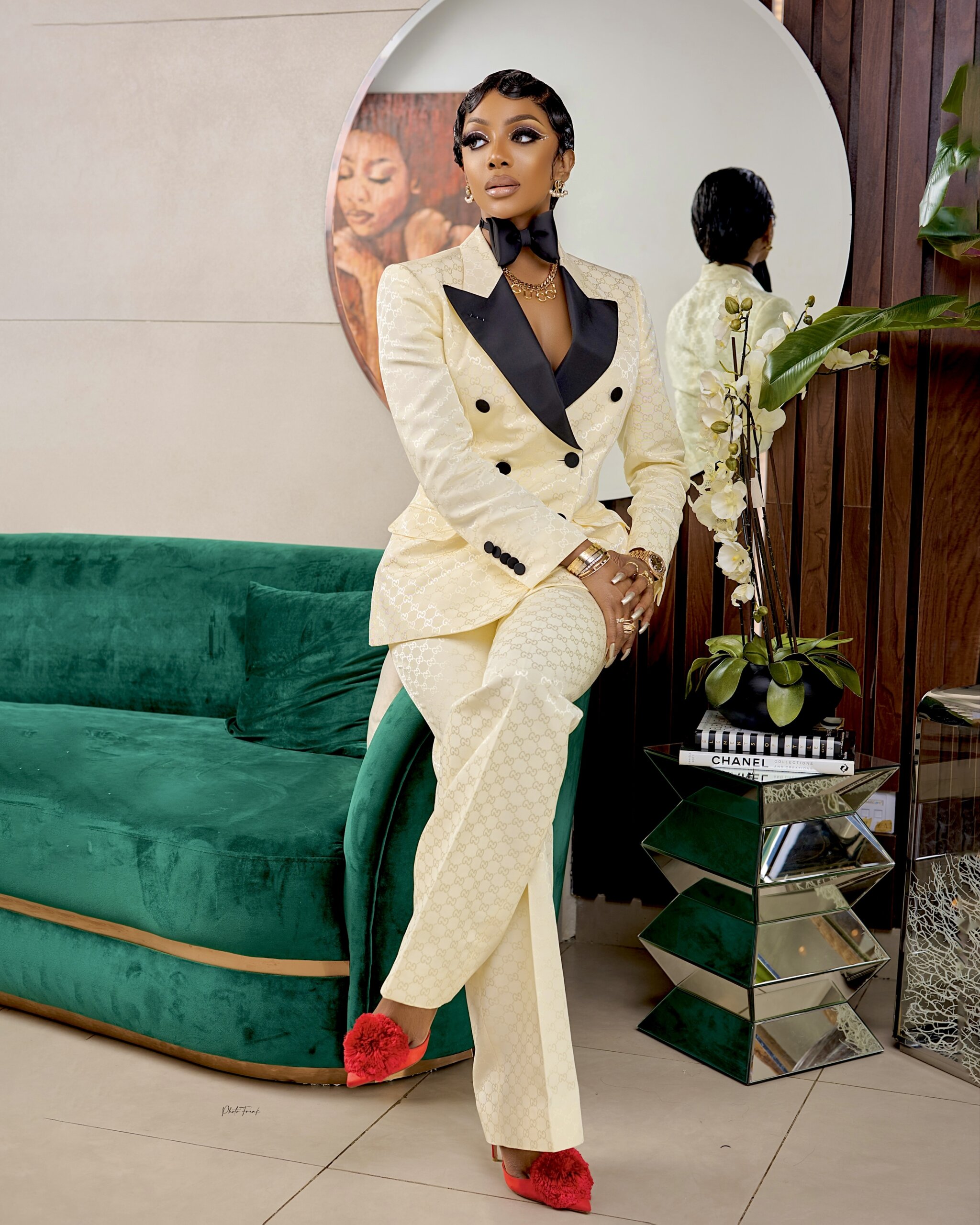
In addition to her various roles, Ikokwu made what some might consider a bold decision to initiate a project focused on investigative reporting on human trafficking.
“Human trafficking is an area that is underrepresented. I’m unsure if it’s because of a lack of interest, or people not having the right institutions to oversee or investigate these issues, or maybe we don’t have the resources in the country to put towards the cause. I don’t understand why, but it’s just an area that has not received as much attention as it deserves, which is worrying because human trafficking cuts across so many different areas.
There are children on the streets who should be in school. They have no business hawking on the road. There are beggars from Niger or neighbouring countries like Chad, that come into Nigeria and start begging, but there’s nothing wrong with them. They have no visible ailments. They are perfectly fine. It raises questions about why young children are on the streets or why a woman carries a baby, not her own, to elicit sympathy and collect money from people in traffic. They all report to someone. They all have a boss. They have an oga at the top to whom they all remit the funds they make during the day. That’s human trafficking.
Who are these people’s parents? Where have they come from? Where did you bring them from, and why are they doing these jobs they have no business doing? They should be in school, attempting to get an education. These could be the leaders of tomorrow, but they are selling pure water on the streets for one wicked man or woman somewhere. There are just so many aspects of human trafficking. It’s like a modern-day slave trade. Slavery was so horrific that people are still recovering. Everyone has PTSD from their forefathers, and it’s still happening in the form of human trafficking today.
I’m a natural-born activist. I naturally hate injustice. I want to use my platform to shed light on the issue, talk more about it, and bring awareness to it. You can never have enough voices to raise awareness on a societal issue as grand as this. I want to raise so much awareness on this issue that the government is pushed to create more bodies and institutions to tackle this or empower the existing ones with the necessary funds, equipment, and human resources to tackle and potentially stop these issues.
Human trafficking is not only in Nigeria; it’s in a lot of African countries and even some countries in Europe. As I said, my audience is very international. I want to bring the global eye to this topic. When certain countries become interested in specific issues, they tend to be taken more seriously. If I can have these international bodies and institutions, through my platform, see what’s going on, the Nigerian or African governments will take it more seriously and help do something about it. That’s my plan.”
Ikokwu leaves with a final style tip.
“Dress how you want to be addressed”
She wants you to trust her when she says people address her based on her outfit and how she’s put together. She finds that when she walks into places or spaces, before anything else, people notice her outfit. “You have to look back because who’s this person? and why are they dressed so amazingly?” She commands the room with her style, which is key because “once you have a floor, an audience or people’s attention, you could be anything.” Ikokwu’s style is imperative, and she always dresses for the occasion.
MORE FROM THIS ISSUE
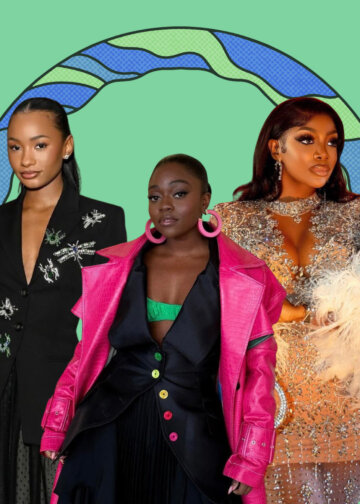
Who’s Your Style Icon? Take This Quiz to Find Out
The best thing about fashion is that it’s art and can be expressed in many ways. As long as you’re ...
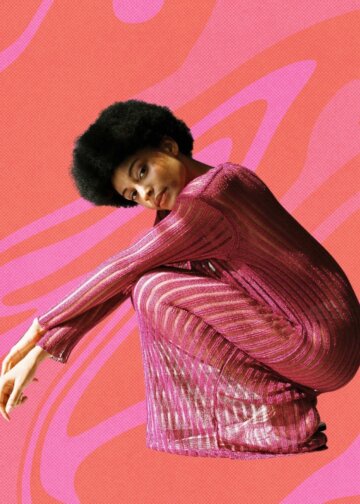
Strutting into New Beginnings: Celebrating 4 Nigerian Models in Fashion’s Spotlight
As we unveil our 2024 Fashion Issue, there was an undeniable truth we couldn't ignore: behind every breathtaking design and ...
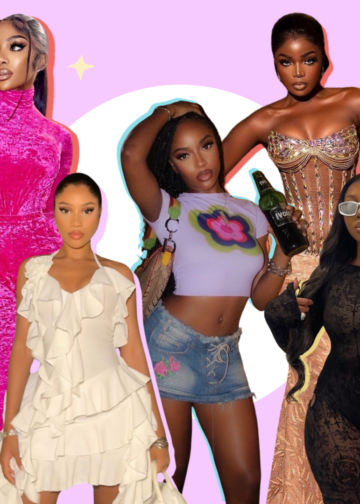
Is It Time to Let Go of These 2023 Fashion Trends?
As we've just recently entered a new year, there’s no better time to flip through last year’s eclectic style diary ...
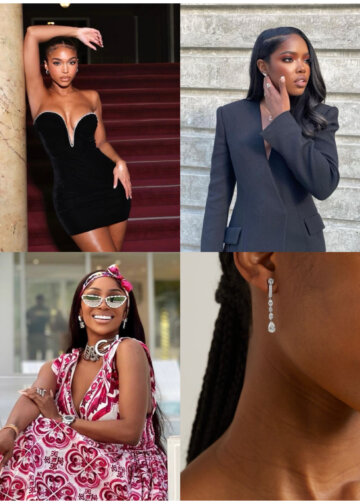
4 Fashion Staples Every Woman Should Own According to Chioma Ikokwu
In a world where trends come and go faster than a blink of an eye, finding a sense of timeless ...
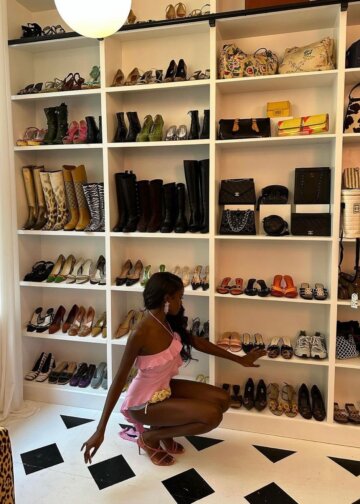
The 5 Relatable Stages of Deciding What to Wear When You Mentally Plan an Outfit
Picture this: you’re standing in front of your full wardrobe, fully dressed (or a little bit undressed) in the clothes ...

Build Your Capsule Wardrobe With 21 MAG
There’s something about beginnings like the start of a new year, month, week or day and wanting to improve the ...

©2024 The 21 Magazine. All Rights Reserved.

